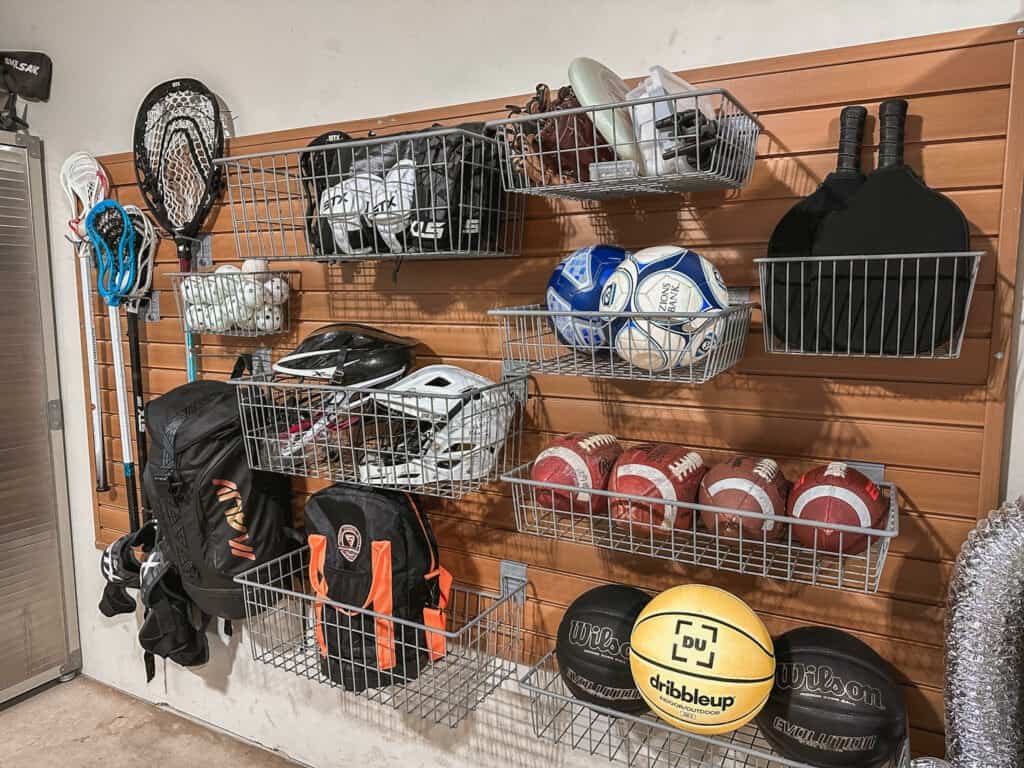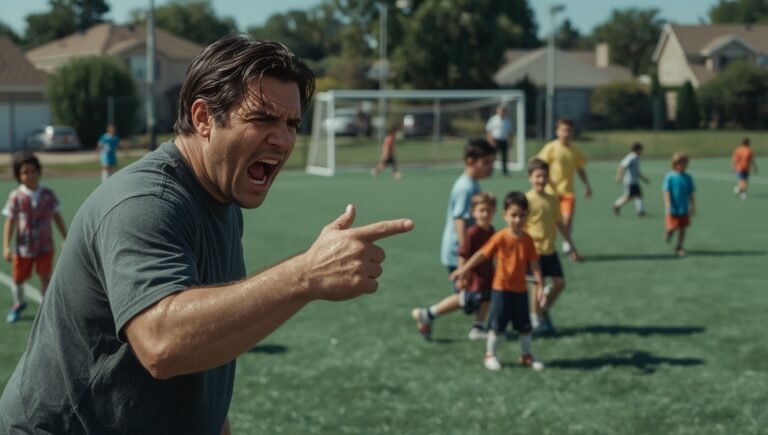Every youth sports parent swears they’re not THAT parent. The sideline screamer? Nope. The post-game car-ride analyst? Definitely not. The one who buys gear like their nine-year-old is heading to the draft next week? That has to be somebody else. Except… it isn’t. It’s you. It’s me. It’s all of us.
The phrase “THAT parent” gets tossed around a lot in youth sports, but it really sinks in the moment your own kid gives you that side-eye from the field. The good news? You’re in good company. Youth sports in the U.S. have exploded into a $19-billion industry, and none of it happens without parents acting like the Super Bowl is being played on Field Six at the local complex. The money, the miles, the emotions, and yes, the iced coffee collide every weekend on the sidelines.
So let’s break it down. These are the classic signs you’re THAT parent—the ones that will make you laugh, cringe, and maybe recognize yourself along the way. From sideline coaching and car-ride critiques to snack-table chaos, referee battles, tournament travel, and the endless gear obsession, it’s all here. And yes, we’ll hit lacrosse, soccer, baseball, hockey, and even that dream of a college scholarship.
The Sideline Voice You Swear Is Helpful

Picture this. Your folding chair is planted right at midfield. Your iced coffee is sweating on the grass. You shift forward like a sprinter in the blocks. Your kid dribbles, the crowd hums, and you launch the classic command that parents have been shouting since the first ball rolled across a field. Shooooot. The ball was already gone two seconds ago. You were not helpful. You were loud.
Now place yourself in your child’s cleats. A kid hears the coach, hears teammates, hears the whistle, and hears you. The brain is trying to juggle instructions and instincts in real time. The Aspen Institute reports that about seventy percent of kids quit organized sports by age thirteen, and a consistent theme in the research is parental pressure. What sounds like encouragement to you often feels like performance management to them.
There is also the acoustic problem. The stands amplify the loudest voice. If your notes sound like you are the assistant coach, the other parents will look at you before they look at the scoreboard. If you have ever shouted so loud that the opposing grandparents turned around in a synchronized head tilt, then you already know the truth. You are THAT parent.
Here is the fix. Use the quiet rule. Talk during warmups and after the whistle. During play, cheer names, not directions. Pick one sentence before and one sentence after. Before the game say Have fun, I love watching you. After the game say I loved watching you play. If you need a deeper dive, save it for a planned practice conversation at home where your kid is rested and ready.
Parent Survival Kit
• Insulated sideline tumbler to keep your coffee warm and your hands busy.
• Sideline chair with shade to sit instead of pacing a trench in the grass.
Related read: Top 10 Sports Parent Meltdowns That Deserve an Emmy
The Equipment Obsession

Enter the temple of gear. You walk into the store and your pupils dilate like a cat at midnight. Lacrosse shafts gleam like silver swords. Composite bats promise exit velocity like a video game. Hockey parents whisper brand names like they are discussing fine wine. You run your finger down a price tag and swallow hard, then convince yourself that this stick will give your kid an edge.
The youth sports economy thrives on this exact moment. Parents do the mental math. Better gear equals better performance equals better opportunities. Sometimes it helps. Often it does not. Nine times out of ten it is not the two hundred ninety nine dollar bat. It is the kid who swings it with confidence, timing, and hundreds of boring reps when no one is watching.
Look in the garage for the truth. There is a retired helmet with team stickers from three seasons ago. There are two bags that smell like an entire science experiment. There is the emergency bucket of baseballs, the net, the cones, the ladder, and the collection of orphaned water bottles. If your garage looks like the clearance corner of a sporting goods store, then welcome to the club. You are THAT parent, and yes, the industry thanks you for your service.
Smarter gear choices make everyone happier. Buy the thing that solves the real problem. If your kid forgets water, get a giant bottle that never leaves the bag. If the smell is unbearable, buy a bag that quarantines funk. If the stick is fine but confidence is not, invest in a private session, not another shaft.
Parent Survival Kit
• Lacrosse backpack with vented compartments to protect your car and your nose.
• Bat bag with wheels so your back does not retire before the season ends.
Related read: Snack Parents Gone WildSnack Parents Gone Wild: Buddy, It’s Just Juice BoxesSnack Parents Gone Wild
The Pre Game Pep Talk That Turns Into a TED Talk
You mean well. You slide the car into park. You take a breath like a coach before a championship speech. You deliver a tight thesis on grit, discipline, and legacy. You quote Michael Jordan. You sprinkle in a story about your own high school days that your kid has heard fourteen times. By the end, the windows are foggy and your kid is late to warmups.
Here is what kids say they want right before a game. Keep it light. Keep it short. Keep it about fun. Studies have found that the sentence that lands best is Have fun. That is it. The longer you talk, the more you push your kid out of the present moment and into a checklist. Games are not tests. Games are rehearsals for resilience.
Try the ninety second rule. Ask a simple question about their friends or the pregame song. Keep your voice calm. Smile on purpose. Then be the first one to say Have fun, I love watching you. It is impossible to overuse that sentence, and it does not require a slide deck.
If your kid is glazing over in the driveway because you are on chapter six of The Grind Never Stops, then breathe. You are THAT parent, and you can change the habit today.
Parent Survival Kit
• Sports earbuds for your athlete who needs a music bubble to get ready.
• Small notebook to jot ideas you want to share later when they are ready to talk.
Related read: The Car Ride Home
The Ref Enemy Number One

Refs are like dentists. They are necessary. They are underappreciated. They are often avoided until there is a crisis. Most youth refs are teenagers earning gas money, retirees who love the game, or parents giving their time back to the community. They miss calls. They also keep the game alive.
The National Association of Sports Officials has reported ref shortages across many sports and says verbal abuse is a major reason officials walk away. Some local leagues have even canceled games because there are not enough officials to cover the schedule. Without refs there is no season. That is not a philosophy point. That is basic math.
If you have ever shouted Get some glasses at a sixteen year old with a whistle, that memory will not age well. If you have paced the fence line like a trial lawyer cross examining a volunteer, that video is probably in someone’s group chat. If your watch thinks you are doing a workout because your heart rate spikes at a throw in, the truth is on your wrist. You are THAT parent.
Here is a different path. Decide that you will be the loudest person cheering for both teams when a kid makes a hustle play. Clapping for effort is free. Thanking a ref at halftime is free. Buying a small gift card for a crew at the end of a long tournament is a master class in community building.
The Snack Table Overachiever

You signed up for snacks. You turned it into a culinary show. There are fruit skewers with team colors. There are muffins shaped like soccer balls. There are custom water bottles with vinyl names that took an hour each. The children nod politely and grab the bag of chips and a juice box.
The National Alliance for Youth Sports reminds teams that hydration matters more than sugar spikes. For most weekend games, simple and predictable beats creative and fussy. When snacks become a competition, parents feel judged and kids get a strange message about food and effort.
If you have ever gotten side eye from the group because you brought quinoa energy bites to a group of ten year olds who just want pretzels, then yes, you are THAT parent. Take a breath. The goal is fuel and fun, not a Michelin star.
Simplify the system. Rotate duties. Ask about allergies in writing. Keep a small cooler for coaches and officials who came straight from work. Your teammates will thank you and your trunk will stop smelling like citrus and glue sticks.
Parent Survival Kit
• Sideline snack organizer to keep the table tidy.
• Portable cooler with wheels so you do not carry a miniature fridge.
The Post Game Ride Home

The game ends and the most dangerous twenty minutes in youth sports begins. The car becomes a film room. You replay every touch, every shift, every at bat. You start with I am not mad, I just want to talk about effort which is exactly how every kid knows a sermon is coming.
Michigan State research is often summarized this way. The single sentence kids want to hear after a game is I love watching you play. They do not want your heat map of their positioning. They do not want your lecture on hustle. They want a parent, not an analyst.
Use a simple plan. Ask Do you want to talk about it or do you want ice cream. If your kid wants space, give it. If they want feedback, ask what they saw first. Make one point, not seven. If you cannot help yourself, set a timer for five minutes and then move on to music and milkshakes.
If you have ever said We will talk about your effort later then you already know the verdict. You are THAT parent. The good news is that this one habit change will transform your relationship with the sport and with your kid.
Parent Survival Kit
• Noise cancelling earbuds for kids for post game recovery on long rides.
• Dash mounted phone holder so your hands stay where they should while emotions cool down.
The Social Media Scout

You have a custom hashtag for your kid. You post slow motion clips with dramatic music. You have learned more about editing than you ever wanted to know. You are also very aware that the other parents are watching your clips while pretending they are not.
We live in a highlight age. Some coaches do check Instagram and Hudl links. Some do not. What everyone notices is how you behave while you film. If you are sprinting the sideline and swaying like a ship in a storm, your video will make people seasick and your kid will pretend you are a distant relative.
Smart filming helps. Choose one end line for the half and stay there. Record the full possession, not just your kid’s touch. Keep the mic covered so your sideline commentary does not star in the clip. Share the reel in the team chat only when it highlights multiple players.
If you have ever added Eye of the Tiger to a practice drill, you are probably THAT parent. Keep creating, but make the content serve the team, not your ego.
The Tournament Travel Maniac
There is nothing like a travel weekend to reveal your true form. You turn a random exit off the interstate into a base of operations. There is a cooler packed tighter than a rocket payload. There is a spreadsheet with room numbers and breakfast times. There is always one parent who finds the indoor pool and becomes the cruise director. Sometimes that parent is you.
The Aspen Institute has estimated that families in travel sports spend between two thousand and ten thousand dollars per year on tournaments, hotels, and gas. That is not a hobby. That is a second budget line. The money is real and so is the stress that comes with logistics, sleep, and team meals.
You can spot the Tournament General in any lobby. They are arguing with the front desk about a late checkout while juggling a bag of bagels and a stack of room keys. They have a group text that pings like a fire alarm. They also hold the team together when things go sideways.
If you have ever debated hotel breakfast hours like it was a court case, you are THAT parent. Channel the energy into things that matter most. Sleep, hydration, food that kids will actually eat, and directions that do not arrive when the warmup whistle blows.
The Scholarship Believer

You love your child and you love a plan. You know the roster of your favorite college and you follow the assistants on social media like you are scouting a draft. You can quote NCAA rules in your sleep. Your child is twelve.
Dreams are healthy. Pressure is not. Only a small slice of high school athletes play in college, and a smaller slice receive athletic money. Families often pour years into the wrong timeline. You do not need to be in the recruiting funnel in seventh grade. You need to be in the growth funnel. That means school first, coachable habits, consistent training, and a love of the game that does not depend on the last box score.
If you have already bookmarked admissions pages and practiced campus tours in the driveway, then yes, you are THAT parent. Keep the dream, change the calendar. Save the big push for high school years. Use the middle school years to build the person you would want a coach to recruit.
A smart step now is education. Learn how different divisions work. Learn how academic aid, need based aid, and athletic money can stack. Learn what a highlight video should include and when to email a coach. Then close the laptop and play catch.
The Coach in the Stands

There is a play that you love to yell. Run the pick and roll. You yell it during soccer. You yell it during baseball. You would yell it during chess if they would let you into the tournament hall. You have a dry erase board in your trunk. You are certain you see the game better than the volunteer on the sideline who gave up their Saturday.
Parent and coach friction is not new. Surveys from youth organizations regularly list parent behavior as one of the top reasons coaches quit. When a coach walks away, a team can collapse, and the kids who needed that team the most lose their place. Your intent may be to help, but your volume often makes it harder for kids to hear the one voice that matters during play.
If you have ever argued substitutions with a bench or diagrammed a press on a napkin at halftime, then your promotion is official. You are Coach THAT Parent. The stands do not need another coach. The stands need a grown up who models respect when the call goes the other way.
Channel the energy the right way. Volunteer for a practice to run a fun drill. Ask the coach how you can help set cones or collect pennies. Buy the team pizza when no one expects it. When you serve the program, your kid learns what leadership looks like.
Parent Survival Kit
• Dry erase coaching board for home chalk talks that do not hijack the game.
• Comfortable bleacher seat so you can relax and let the coach coach.
Related read: Cheering at Your Kid’s Game Without Totally Humiliating Them
The Bottom Line
If you saw yourself in more than two sections, spoiler alert is confirmed. You are THAT parent. That is not a sentence. That is an invitation. Laugh at yourself. Change one thing this week. Decide to be the loudest person cheering effort, not outcomes. Decide to be the person who thanks a ref and hugs a coach. Decide that your kid’s memories will be about friends, bus rides, and ridiculous tournament stories, not lectures about hustle in a car that smells like wet socks.
One day the folding chairs get packed away. The orange slices stop. The uniforms go into a shadow box. The car rides home are quiet. Until then, be THAT parent, but be the one your kid loves playing in front of.
Frequently Asked Questions
What is a THAT parent in youth sports
A THAT parent is any adult whose behavior turns a kid event into an adult project. Yelling, overcoaching, overspending, or living through a child’s highs and lows are common signs.
How do I stop being THAT parent
Use three habits. Cheer names not directions. Use the magic sentence I love watching you play. Ask your kid if they want feedback or just a hug. Repeat.
What should I say before a game
Keep it short. Have fun. I love watching you. If you must add a third sentence, ask What are you excited to try today.
What should I say after a game
Start with I loved watching you play. Ask if they want to talk now or later. If they want feedback, ask what they noticed first and add one thought, not a speech.
Why do parents ruin youth sports
Most do not try to. Passion, money, time, and identity get tangled. The fix is humility and perspective. Remember that the point of youth sports is joy, growth, and community.








